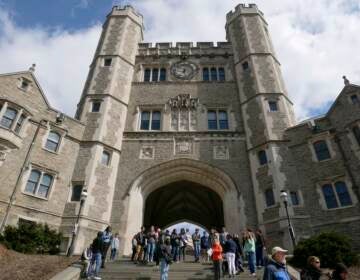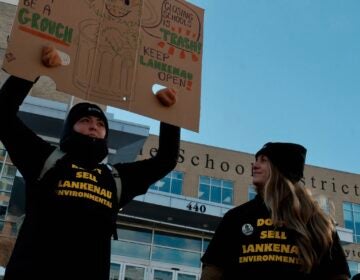Will Philly delegation ‘play ball’ on budget to win dollars for city schools?
Listen
State Capitol, Harrisburg, Pa. (Image courtesy of WikiMedia Commons)
Facing a $66 million budget shortfall that threatens to turn schools into “empty shells,” the Philadelphia school district has turned its pleas for additional funding to Harrisburg.
But lawmakers there are grappling with a $1.4 billion hole in their own budget – making the district’s budget woes but one of many legislative pieces being maneuvered on the capitol chessboard.
With mere days remaining before the state’s June 30 budget deadline, the halls of the state capitol are a buzz with politicking and strategy.
Education advocates lobbying on behalf of Philadelphia school children have a wish list:
Allow Philadelphia to put a $2 per pack tax on cigarettes sold within the city, keep the additional education funding that Governor Tom Corbett proposed in February and, while you’re at it, levy a broader tax on Marcellus Shale natural gas drilling and save money by accepting the federal Medicaid expansion.
“I always try to educate people to the reality of it, and the reality of it can be very frustrating,” said state Rep. Pam Delissio, D-Philadelphia.
Delissio says she’s had a few tense conversations with her Northwest Philadelphia constituents whose overarching concern is education funding.
“Unless people understand the reality of sort of how it works up here,” she said, it’s difficult to “get what you want done.”
The proposed Philadelphia cigarette tax is a prime example of Harrisburg politics at work.
That tax, which Philadelphia City Council passed last Spring, is expected to generate at least $40 million in its first year and double that for years to come, all going to the Philadelphia School District.
For the past year, it’s been a non-starter in Harrisburg.
But it’s recently found increased momentum following the consistent lobbying efforts of Superintendent William Hite, School Reform Commission Chairman Bill Green, Mayor Michael Nutter, City Council President Clarke, the Philadelphia Chamber of Commerce and an assortment of education advocacy groups.
According to many politicians interviewed for this story, passing the measure will require what Clarke has called “horse trading and bartering.”
“Republicans have basically said, ‘there are things that you’re interested in, and there’s things that we’re interested in,'” said state Sen. Anthony Hardy Williams, D-Philadelphia. “And so we have to compromise.”
Republicans would like to reform the state’s pension system which is underfunded by $50 billion.
In the plan that Gov. Corbett’s administration favors, new state employees would move to a hybrid retirement system that would offer a blend of traditional pension with a defined contribution 401(k). Corbett expects this to save as much as $11 billion over the next 30 years. Existing state employees would not be affected.
Leading Republicans in the House have also been pushing to privatize the state’s liquor store system.
“If Philadelphia Democrats aren’t going to be there for what needs to be done, then nobody’s going to be there for them,” said state Budget Secretary Charles Zogby. “And they can go home and tell their constituents why they couldn’t get money for the school district.”
Both deals are toxic for labor unions, which along with education advocates make up a key bastion of the Democratic Party’s base.
So does this pose a Faustian dilemma to Philly democrats?
“I’m not going to vote for something I don’t believe in, but…everybody is clear that we have to do something about pensions,” said Sen. Williams. “We can’t sustain the model that we currently have, and we have to do something about it. Now what that looks like varies from their perspective, to the Democratic perspective. So there’s differences in how we get to that point.”
“It’s hard to imagine that [the cigarette tax] would come as a result of us doing the right thing without that trade off,” said Rep. Delissio. “That would almost be too easy.”
State Rep. James Roebuck, D-Philadelphia, refused to talk compromise.
“The Republicans that control the government have the responsibility for doing certain things, among which is to provide a thorough and efficient education for all the children in the commonwealth,” Roebuck said. “That’s not something you bargain with. Either you do it or you don’t do it. If you don’t do it, then you shouldn’t be governing.”
Power struggle
With only days remaining until the June 30th budget deadline, both parties are in full posturing mode.
Democrats feel they have power because they think moderate republicans need them in order to pass revenue-raising-measures that would avoid additional unpopular cuts.
“It doesn’t look like there’s a lot of political appetite for a budget that doesn’t include [new] revenues,” said Ben Waxman, spokesman for State Sen. Vincent Hughes, D-Philadelphia, who is minority chair of the appropriations committee.
Democrats have pushed for a 5 percent shale tax that would generate an additional $700 million in revenue.
Tax-averse, far-right Republicans won’t vote for any revenue-raising measures, the theory goes, so passage requires Democrats.
“Politics trumps any party,” said Donna Cooper, executive director of Public Citizens for Children and Youth who also served in Ed Rendell’s cabinet when he was governor.
PCCY staged a sit-in at the state capitol Thursday, joining other advocacy groups in their consistent calls to make education funding top priority.
“These guys don’t want to go home in an election year with a budget cut, no Republican or Democrat,” Cooper said. “So they don’t really have a choice, other than to do revenues. And once they do revenues, they need the Democrats.”
Republican leaders disagree.
Steve Miskin, spokesman for House majority leader Mike Turzai, R-Allegheny, says Democrats either ‘play ball’ or it’s ‘game over.’
“I’m just telling you: the cigarette tax is off the table as long as they continue to be a ‘no’ on everything,” said Miskin. “It’s not just a one vote. It’s the whole series. If they continue to be a ‘no’ on everything, that’s where it’s at.”
On Wednesday, the House passed a $29.1 billion budget mostly along party lines. This budget included a $70 million increase to the state’s basic education subsidy, significantly less than the $240 million increase that Corbett proposed in February as part of his Ready to Learn block grant.
Between $29 million in Ready to Learn money and $10 million in proposed pension savings, the Philadelphia School District has been counting on an additional $39 million in its budget projections.
If these funding streams disappear, the district’s budget gap will grow wider.
It’s widely expected that the House budget will not become the final document “as is.”
The Senate is now working on its version.
Before being implemented, both chambers and Corbett need to give their blessing.
On Thursday, Corbett called on the House to make an up-or-down vote on pension reform.
Stalemate?
Based on revenue projections to this point, the state’s budget deficit hovers around $1.4 billion.
While June revenue numbers aren’t yet in, Zogby said he’s seeing encouraging signs that could bring the deficit down to a $500-650 million.
If so, he says there’s a chance that the two parties stalemate continues and there are no additional budget cuts, no new revenue-raising-measures, and no additional funding for Philly schools.
No matter what happens, education advocates are continually learning that school funding is but one pawn in a much larger game.
State Rep. Cherelle Parker, Chair of the Philadelphia delegation, remains hopeful that in the end schools will win.
“This process is far from over,” she said.
WHYY is your source for fact-based, in-depth journalism and information. As a nonprofit organization, we rely on financial support from readers like you. Please give today.





